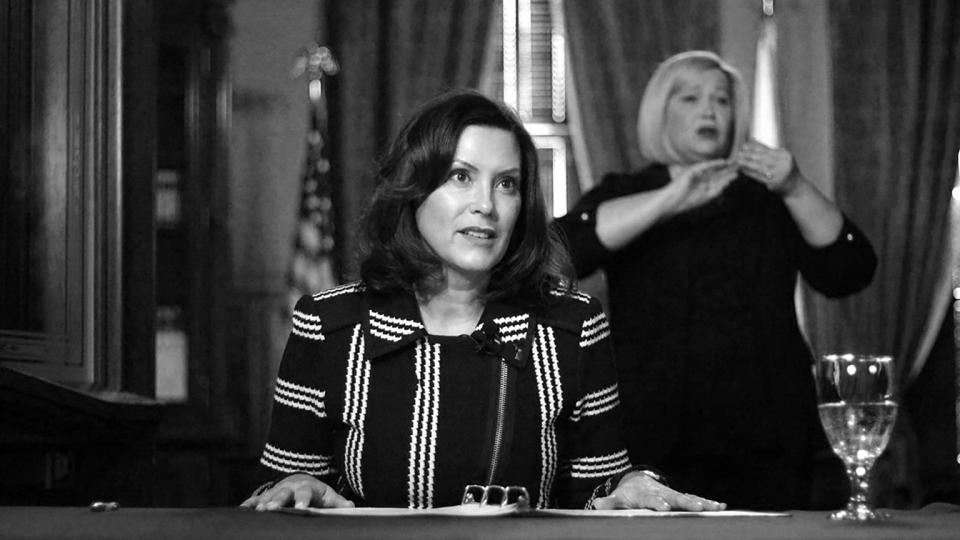Michigan Gov. Gretchen Whitmer discusses why coronavirus is disproportionately affecting minorities
Michigan Gov. Gretchen Whitmer, widely touted as a potential vice president pick for Joe Biden, is offering fresh evidence that the coronavirus pandemic in her state is disproportionately affecting minorities, citing statistics that 41 percent of those infected in Michigan are people of color.
“I think that’s an important part of the conversation that we’ve got to have as a country, as a state,” Whitmer said in an interview with “Skullduggery,” a Yahoo News podcast. “There are inequities that have festered in our country for a long time, and I think that that’s part of a contributing factor to what we’re seeing on the ground.”
The unusually high percentage of minority residents in her state who are infected is the latest sign that the virus seems to be hitting African-Americans and other minorities far more severely than others in the population. Whitmer noted that only 17 percent of her state’s residents are people of color.
“It’s too early to draw final conclusions,” she added. “But the fact of the matter is, it’s concerning. And I think you see similar data coming out of Illinois and out of Louisiana.”
Whitmer’s comments came amid new reports from across the country of the coronavirus’s severe impact on minority communities. A Washington Post report on Tuesday found that counties that are majority black have three times the rate of infections and almost six times the rate of deaths as counties where white residents are in the majority.
The mounting evidence has prompted calls by Democratic lawmakers for the federal government to release daily race and ethnicity data on coronavirus patients and a new recognition by the White House that the issue is of vital concern. “Why is it three or four times more so for the black community as opposed to other people?” President Trump said at a White House briefing Tuesday. “It doesn’t make sense, and I don’t like it, and we are going to have statistics over the next probably two to three days.”
Whitmer, in the “Skullduggery” interview, was responding to a question about why Michigan had become a national hot spot for the virus and the disease it causes, COVID-19. As of Tuesday, the state had more than 18,000 cases and 845 deaths — the third-highest totals in the country, behind only New York and New Jersey. She noted that Detroit, like Chicago and New York, has a major international airport with lots of visitors from foreign countries.
“Detroit is an international hub,” she said. “We’ve got a lot of people [who] call Detroit home and come to and from the city of Detroit. And we also have a population [with] a lot of people who are in poverty, who don’t have access to health care, who don’t have access to a job that gives them enough money to support a family and to do all the things that we know help you avoid the worst kind of outcomes from COVID-19.
“And so I think that there are a lot of contributing factors here. I don’t think anyone knows precisely why a certain community has more COVID cases than another.”

Download or subscribe on iTunes: “Skullduggery” from Yahoo News
Whitmer’s comments are especially significant given her newfound prominence on the national scene. Last week she appeared on a podcast with Biden where the two lavished praise on each other; after Biden touted her leadership in the crisis and said he was “proud” of the job she was doing, Whitmer responded that the two of them had a “mutual admiration society.”
But Whitmer’s higher national profile and her criticism of White House response efforts have also invited attacks from Trump, who referred to her in a March 27 tweet as “Gretchen ‘Half’ Whitmer” who was in “way over her head.” Trump also said he instructed Vice President Mike Pence, who is overseeing the federal government’s response to the coronavirus, that he should not “call the woman in Michigan.”
But Whitmer says she and the president have since made peace. “I’ve talked to the vice president a number of times,” she said. “Those have been very positive conversations, and even after the infamous comments, the president called me directly and we had a positive conversation.
“It was not a scheduled call, so it was a bit of a surprise,” she said. “But a welcome one, because I had asked for a phone call. It took a few days … for it to become a reality, but you know we’ve got to have an open line of communication. And I reiterated what I’ve said on on the national news media a number of times, which is we are not one another’s enemy.”
Asked if the president expressed any regret or apologized for his previous remarks, Whitmer said, “No, and neither did I. I think we both just wanted to forget it happened.”
As for the talk about her as a potential Democratic nominee for vice president, Whitmer insisted she is putting “every ounce of energy that I have” into fighting the coronavirus. She also said she has not yet been asked to provide any background information to the Biden campaign for a potential vetting of her as a vice presidential pick.
“I didn’t ask to be thrust into the national spotlight the way that I have been,” she said. “It is flattering to even be considered, and we’ll see where it goes. But I haven’t put a whole lot of thought into it at this point.”
_____
Click here for the latest coronavirus news and updates. According to experts, people over 60 and those who are immunocompromised continue to be the most at risk. If you have questions, please refer to the CDC’s and WHO’s resource guides.
Read more:



